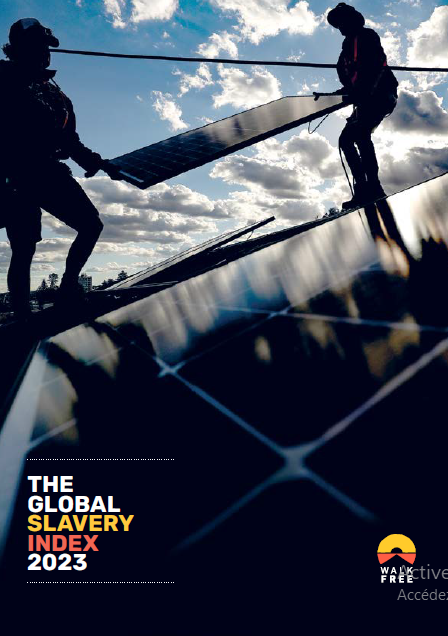
The Global Slavery Index
Auteurs : Walk Free Foundation
The Global Slavery Index (GSI) sheds light on the pervasive issue of modern slavery, encompassing forced labor, servile marriage, human trafficking, and various forms of exploitation. In 2023, an estimated 50 million individuals were living in modern slavery, marking a significant increase since 2016. The report reveals a global landscape marred by compounding crises, including armed conflicts, environmental degradation, assaults on democracy, the rollback of women’s rights, and the enduring impact of the COVID-19 pandemic.
Approximately 10 million more people have fallen victim to modern slavery since 2016, highlighting a worsening situation globally. The 10 countries with the highest prevalence include North Korea, Eritrea, Mauritania, Saudi Arabia, Türkiye, Tajikistan, the United Arab Emirates, Russia, Afghanistan, and Kuwait. Additionally, India, China, North Korea, Pakistan, Russia, Indonesia, Nigeria, Türkiye, Bangladesh, and the United States collectively account for almost two-thirds of people in modern slavery.
Despite generally low prevalence, G20 nations, such as Switzerland, Norway, Germany, Netherlands, Sweden, Denmark, Belgium, Ireland, Japan, and Finland, still grapple with instances of modern slavery. Vulnerable populations, including women, children, and migrants, remain disproportionately affected, with over half of victims being female, and migrant workers facing over three times the risk of forced labor compared to non-migrants.
The report underscores the interconnected nature of global challenges and emphasizes the shared responsibility of governments, businesses, and the international community in combating modern slavery. While some progress has been made since 2018, the response remains inadequate, with governments falling short in adequately protecting the most vulnerable. The urgent need to transition from intention to real action is highlighted, urging a reinvigorated movement led by survivors for lasting solutions. Recognizing the interconnection of challenges, the report advocates for a holistic approach, weaving together efforts to address modern slavery, climate change, conflict, poverty, gender inequality, and racial injustice. It calls for immediate and comprehensive actions to fulfill the commitment made through the Sustainable Development Goals (SDGs), emphasizing the urgency of moving from intention to tangible results
Thématiques
- Législation et Cadre Légal
- Voix des survivants dans l'élaboration des politiques
- Prevention de la traite
- Protection des victimes
- Partenariat
- COVID
- Données sur les tendances de la traite
Population Ciblée
- Autre
- Organisations internationales
- Professionnels en lien avec la lutte contre la traite
- Secteur privé
Type d’exploitation
- Esclavage ou les pratiques analogues à l’esclavage
Focus géographique
- Monde

